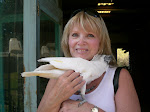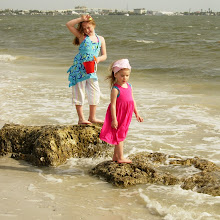At Lugu Lake in China, Mosuo women call the shots, own the property, freely choose (and discard) sexual partners and keep the faith, which is a blend of Buddhism and Animism.
As in the Jewish tradition, the lineage passes through the mother. Unlike most cultures, in this one from the tender age of 13 the young woman (girl) is able to choose her partner and begin her sequence of "walking marriages". I saw this on National Geographic last night and was so fascinated I can't get it out of my head.
If you have time for a preview of what National Geographic has covered, take a look at this quick video. When you have more time, track down the full program on cable.
http://video.nationalgeographic.com/video/player/news/culture-places-news/china-mosuo-apvin.html
I'm BORROWING from some websites I found. I'll post links at the bottom.
The isolation of the Mosuo people, who have lived in the remote lower reaches of the Tibetan plateau for more than 1,500 years, have enabled them to preserve a way of life once common in Tibet. Most of the rest of China believes that "it is better to have a dog than a daughter" and women are treated, at best, as second class citizens.
The Mosuo women, however, are free from such attitudes. Indeed, male and female roles are almost reversed: women run the households, hold the purse strings and - to the fascination of their Chinese neighbours - choose their nightly sexual partners.
Relationships among the Mosuo can last for a night, a decade or a lifetime. From the age of 18 women court the local men. After a coming-of-age ceremony, the woman moves from sleeping near the hearth at the front of the house to her own room at the back where she may receive her lovers.
After a time the women settle down, sleeping regularly with the same man, although they do not necessarily stick with him forever.
Each Mosuo household is headed by a woman who lives with her brothers, sons, daughters and grandchildren. In the evening the adult men leave to visit their partners and the fathers of the children of the house come calling. Such arrangements are known as "walking marriages".
In the Mosuo language there are no words for father, illegitimacy, single mother, widow, jealousy, virgin, or monogamy. The explanation is simple: these concepts do not exist.
Men, who have accepted their passive role, hang around waiting to be picked as a mate or to be told to haul fish from the deep, clear waters of Lake Lugu. It is an arrangement that suits one of the fishermen, Ai Le Shan Ma, 38, very well. Sitting by a smoky fire with his "brother-in-law", Shan Ma claimed that walking marriages take the stress out of a relationship.
He said: "Our 'marriage' is better because it is for love only. I come over at night because I want to. If we didn't get on, if we fought all the time, we would split and find other partners."
Though Mosuo men live with their mother, and are not responsible for rearing their own children, they have the duty to help bring up the children of their sisters. In a Mosuo family, uncles are the decision makers on external affairs. They have an adage, "The biggest flying thing in the sky is eagle, the biggest walking thing on the earth is uncle." When they get old, their nieces and nephews attend upon them until their death.
The dominant role of women in Mosuo society is a unique remnant of a life that was once common in this part of China. As ancient wars took away the men, women assumed control.
The tradition has survived only on the shores of Lake Lugu. Perched at an altitude of 9,000ft, the area first came to Western attention in the 1920s through the writings of Joseph Rock, National Geographic's reporter in China, whose work inspired James Hilton's classic novel Lost Horizon.
This chunk is from a great blog I found from a writer who moved from China to Boston:
http://www.insideoutchina.com/2009/01/mosuo-walking-marriage-on-lugu-lake-2.html
All relationships are based on love. A big matriarchal family with tens of members is filled with joy and peace. Children are loved by multiple mothers. Elders calmly enjoy their final years with a loving family. In another thousand years, will we Han evolve to such an ideal state? But the vanguard Mosuo people already began the heavenly life 1500 years ago.
One morning I was photographing a sunrise at the lakeside, and ran into a bunch of tourists waiting for a bus to return to Lijiang. A fifty-ish northern woman was talking volubly. She said, "Yesterday I asked the young man rowing the boat, 'You sing and laugh all day, do you ever have an unhappy moment?' But he asked me back, 'What is "unhappy"?'
I wasn't convinced and again asked a girl who was washing her hands in the lake, 'Are there times that you feel unhappy?' She replied, 'Unhappy? Why unhappy?'"At this point the northern woman got very excited and raised her voice, "Look! They don't even know what unhappy means! They are always happy!"
Her companion replied that nobody can always be happy. The woman argued, "They don't suffer extramarital affairs or property disputes like in our Han families, why shouldn't they be always happy?"Her friend teased, "Sounds like heaven, then why don't you stay here?"
The woman said seriously, "I really wish I were a Mosuo woman!"
That was the moment I understood why my friend has lived here contentedly for ten years.
Links to sources I "borrowed" from:
http://www.telegraph.co.uk/news/worldnews/asia/china/1327927/Chinese-men-threaten-lake-of-free-love-where-women-rule.html
http://www.insideoutchina.com/2009/01/mosuo-walking-marriage-on-lugu-lake-2.html
Thursday, May 21, 2009
A world where women are in charge.
Labels:
buddhism,
lugu lake,
mosuo walking marriages,
relationships
Subscribe to:
Post Comments (Atom)





No comments:
Post a Comment